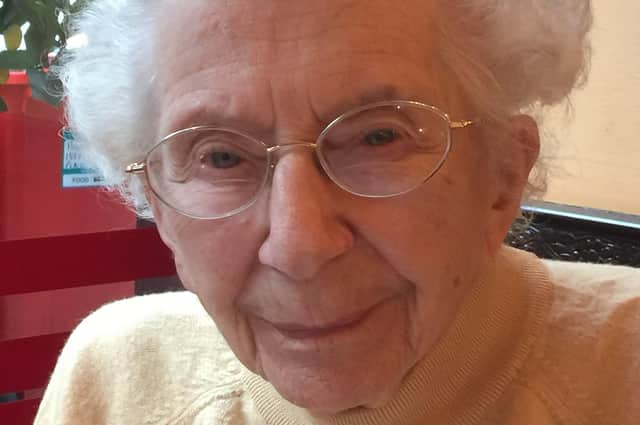Scotsman Obituaries: Professor E Mary Smallwood, classical historian and author


In early childhood, it was recognised that MarySmallwood, daughter of the late Frank and Edith Smallwood, was an exceptionally bright child.
She attended the Mary Datchelor School for girls in Camberwell, South London, where she excelled in her studies and became fascinated by the Latin and Greek languages and ancient history. In 1939 she went up to Girton College, University of Cambridge, holding a major scholarship. Mary earned a double first in Classics, as well as distinction in classical Greek poetry, becoming the second woman ever to reach this level in Greek verse. She graduated with distinction in 1942.
Advertisement
Hide AdAdvertisement
Hide AdAfter completing the Cambridge Teacher’s Diploma in 1943, she taught for four terms at the Alice Ottley school in Worcester, which was a challenging experience, and then spent five terms as a temporary assistant lecturer at Liverpool University.
After the war, in 1946, she returned to Girton to do research and was the holder of various scholarships, including the Craven Studentship of Cambridge. In 1948-51, she was awarded the Jex-Blake Research Fellowship, completing her PhD in 1951. Her thesis was on the political relations between the Jews and the Romans from Pompey to Constantine, 63BC to 312AD, which later she rewrote, and it was published by Brill, entitled The Jews Under Roman Rule, in 1976.
Additionally, Mary wrote a number of articles for scholarly journals; contributed to some composite works; wrote two books for teachers and students − each with a collection of some 400 documents (inscriptions, coin legends and papyri) for the reigns of Gaius, Claudius and Nero in the first book (1966) and for the reigns of Nerva, Trojan and Hadrian in the second (1967); revised Geoffrey A. Williamson’s Penguin translation of The Jewish War by Josephus (1981); and translated Philo’s The Embassy of Gaius with commentary (1961), which she viewed as her best work.
In 1951, Mary went to Queen’s University of Belfast, beginning there as a Lecturer in the Latin Department and ultimately was granted a personal chair in Romano-Jewish history, which she held until retiring in 1983. While at Queen’s, Mary took on some temporary exchange posts, lecturing in the universities of Ibadan, Nigeria, twice in Cape Town, South Africa, and in the Institute of Advanced Studies at Princeton, New Jersey, in the United States.
In the 1970s, Mary began working with the Open University as it was developing its course in classics and widening access to university education. She served as an external consultant and an examiner.
In addition, she tutored many students who were struggling with their studies, helping them to achieve passing grades. She also contributed to the course materials, writing Rome: The Augustan Age for Units 15 and 16, published in 1982.
Mary was always aware of what was happening in the world around her. As a young woman she volunteered as a counsellor at summer camps for displaced girls, many of whom were Jewish children who had been brought to England during the war. While in Belfast she supported the non-sectarian Alliance Party during The Troubles.
While Mary was definitely a distinguished scholar, she was also a very practical person who was capable of knitting jumpers and socks; making dresses and coats for herself, her sister and her nieces; knitting blankets and baby layettes for charity; and tending a lovely garden.
Advertisement
Hide AdAdvertisement
Hide AdAs an active member of Christ Church Morningside in Edinburgh in her retirement, she was faithful at visiting the sick and those who were isolated, often taking along some very welcome homemade marmalade or delicious lemon curd.
In retiral, it was evident that Mary believed in lifelong learning and pursued more studies in music, Hebrew and world geography, travelling on academic tours in Britain, Europe, Canada, and Asia. She regularly attended the meetings of the Edinburgh branch of the Classics Association.
From her early days, Mary was very interested in music, taking piano lessons for many years while in Belfast. She was a regular subscriber to the concerts of the Scottish Chamber Orchestra, attending many operatic productions, ballets and other musical events, and often journeyed to weekends dedicated to singing Gregorian chant, led by the late Mary Berry.
In 2001 as part of the celebration of the 125th anniversary of Christ Church Morningside, Mary updated and rewrote a brief history of the church, which was published in house.
Professor Mary Smallwood was a remarkable woman who has left an indelible mark on the lives of those who knew her as teacher, mentor, encourager, and friend.
Obituaries
If you would like to submit an obituary (800-1000 words preferred, with jpeg image), or have a suggestion for a subject, contact [email protected]